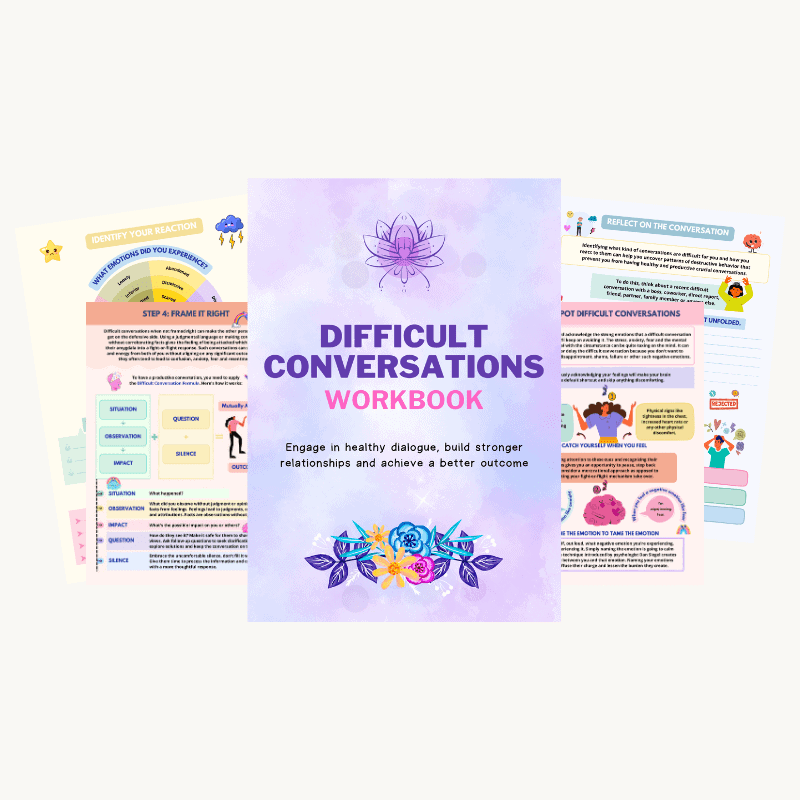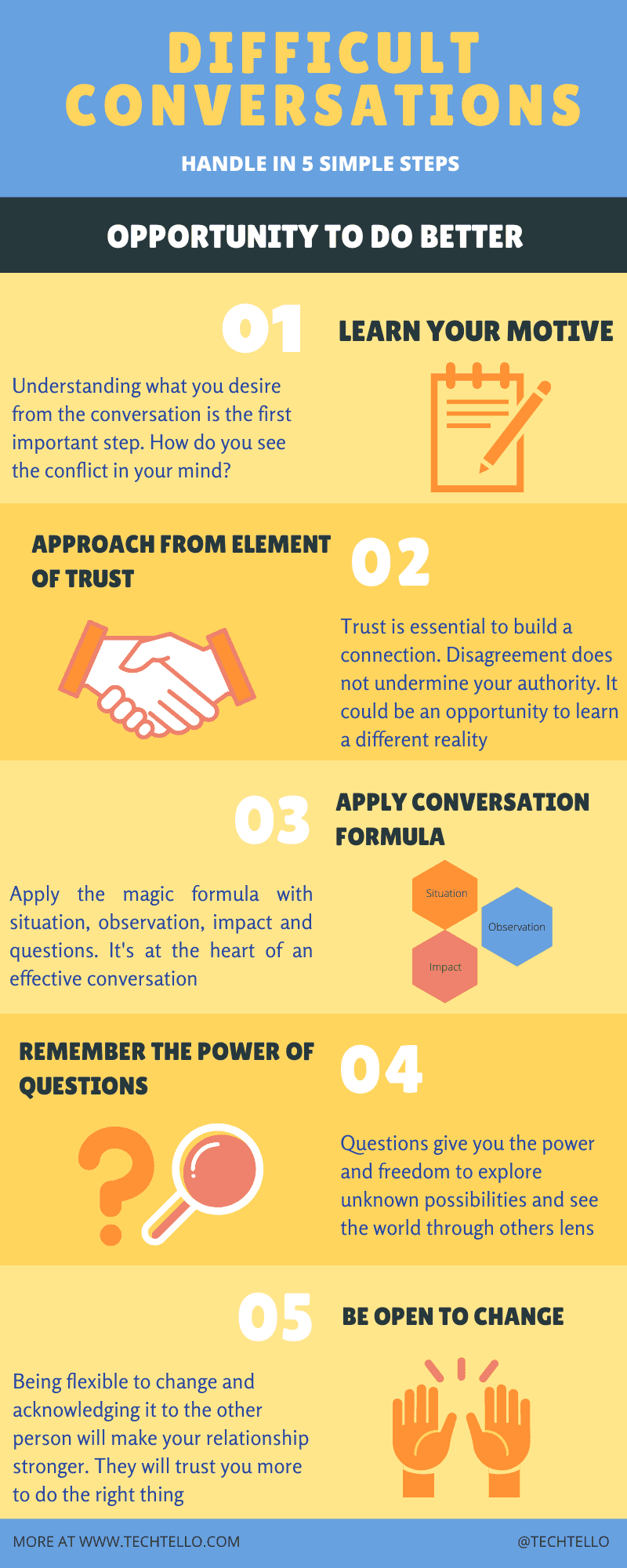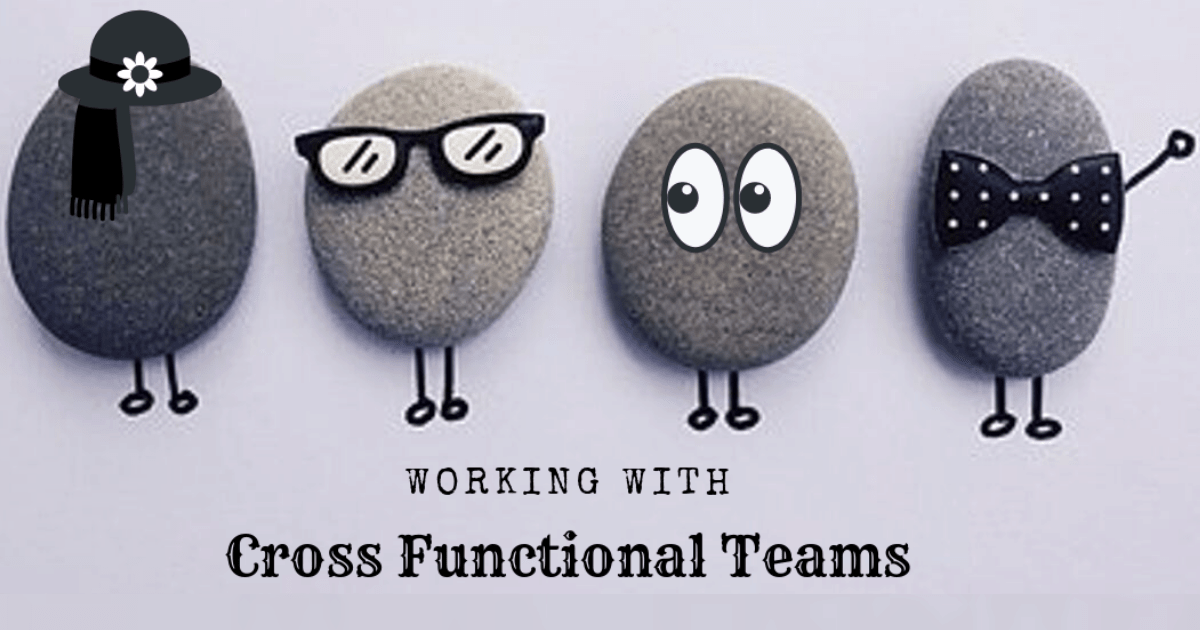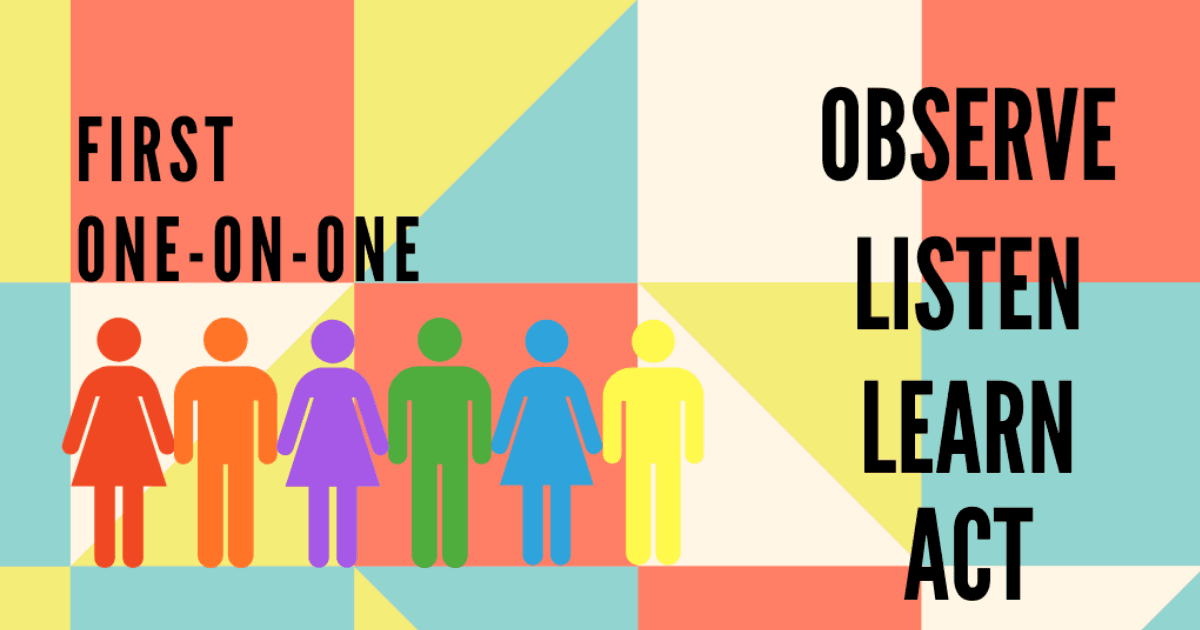How to Handle Difficult Conversations at Work in 5 Simple Steps
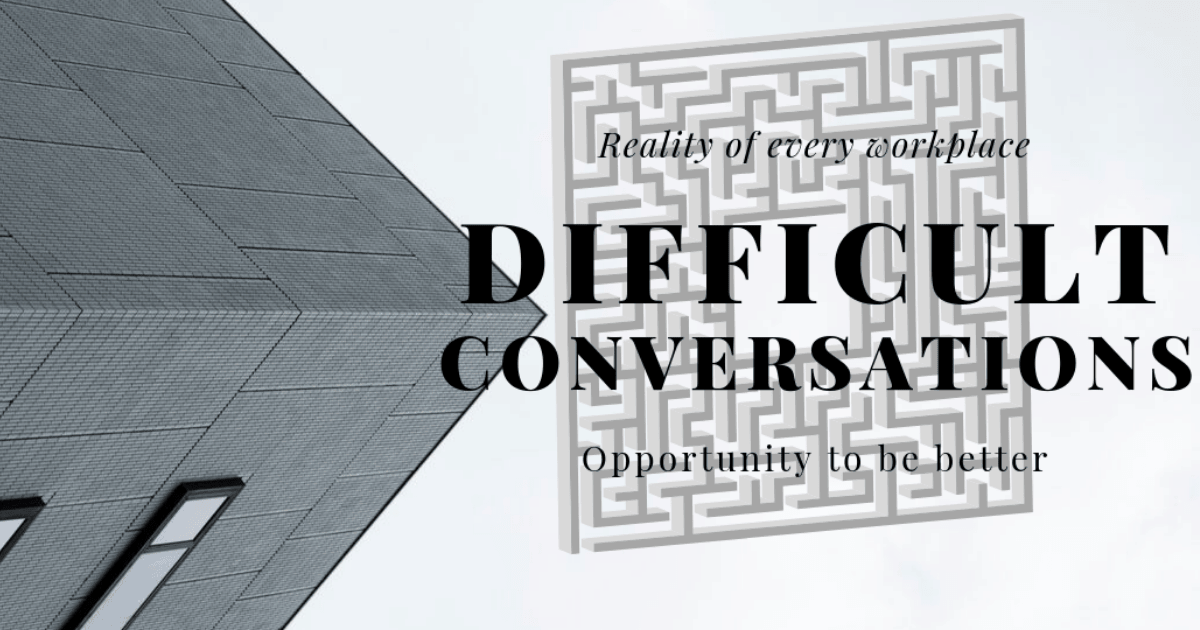
Difficult conversations at work are not a pit, they are a ladder to success in organisations. Fear and self-righteousness can get in the way of a meaningful conversation in which learning from the situation and finding ways to be better is more important than being right.
Imagine a conversation with your boss that starts like this – I wanted to talk to you about your behaviour yesterday. I don’t know why you behaved that way but it cannot repeat. You establish your authority, do not support others or let them make a decision. Your bad behaviour is impacting everyone in the team.
A conversation like this will instantly make you flip and get on the defensive side. Being emotionally attacked will get your amygdala into a fight-or-flight response. You will commit a lot of mistakes in the moment by being confrontational, providing justification without corroborating facts or even denying responsibility for your actions. The negative emotions will suck time and energy from both of you without aligning on any significant outcomes.
Conversations that take this form can have worse outcomes than we imagined. Instead of serving as a means to establish shared understanding and be more productive in our work, it can lead to confusion, anxiety, fear and resentment.
Is the solution to not have difficult conversations at all?
Is conflict bad? Can we truly avoid conflict in the workplace or better keep it aside pretending it doesn’t exist?
When I think about work on a day-to-day basis, I wonder can a workplace exist without conflicts – communicating delays in project timeline, saying no to work, disagreement on goals, achieving cross functional prioritisation, promoting good behaviour at work, managing performance issues, sharing feedback on new ideas, dealing with promotion rejection, aligning on salary expectations, difference of opinions in strategies…the list is endless.
Avoiding conflict, not taking responsibility, denying or worse delaying it doesn’t help. Conflict shows itself in other ways. Conflicts are the reality of every workplace and they provide tremendous opportunity to improve and do better. How we deal with conflict makes all the difference.
Kerry Patterson and Joseph Grenny presented it very well in their book, Crucial Conversations
Crucial conversations well held accelerate the building of trust, they not only not damage it, they create a sense of connection
So, why are we not being conscientious in dealing with conflict if it’s crucial to the health of an organisation. Isn’t it our duty to be as purposeful and conscious of conflict as we are in achieving targets. Why do most people approach it with a condescending tone?
I learnt about it as I realised dealing with humans is difficult. People get emotional about the conflict, deriving an interpretation of it for themselves, a reality they believe exists without validating or thinking about what they want from the conflict. As they march to set things right from their viewpoint, they forget it’s not about them and that makes all the difference.
Making difficult conversations at work simple in 5 steps

If there’s value in dealing with difficult conversations at the right time, why not make an effort to do it in the right way deriving value in meaningful discussions that do not have to be stressful, doesn’t leave you questioning if this is the right job for you, makes you hate the other person or causes confusion about the intent of the discussion.
I have laid out 5 key steps that are simple to apply to keep difficult conversations at work productive.
1. Learn your motive
Understanding what you desire from the conversation is the first important step. Answer some of these questions to help you learn your motive better
- What’s the conflict in your mind, how do you see it?
- Is your intention to punish or support?
- Are you evaluating the situation with a positive mindset?
- Have you validated your facts?
- What outcome do you desire – want them to achieve goals, learn to be independent, be a team player…
- Are you thinking about it emotionally or rationally?
Answering some of these questions for yourself will help you keep your emotions under control and look at the situation without generalising or exaggerating it. Be calm and don’t take it personally, it’s not about you.
2. Approach from an element of trust
Trust is essential to form a connection in which the other person feels comfortable to value the discussion and open up to the conversation.
It requires an understanding of who you are speaking with – their personality and what they value. Learning what to say and how to say it in a manner that the other person can understand is useful to establish a safe space in which both parties feel comfortable in engaging.
If you are their manager, you may already know enough about them as you engage with them on a regular basis. If not, be prepared to discover new things and be flexible to adapt to them.
Once you are ready to approach the discussion with the desire to trust and not with the intention to blame or attack, it’s time to have the conversation. Remember, disagreement does not undermine your authority, it could be an opportunity to learn a different reality.
3. Apply the difficult conversation formula

Be direct and start by describing the situation that required this conversation followed by your observation on the situation. Do not judge or share an opinion about the situation, simply state your observation. Talk about the possible impact as you see it and follow up with an open ended question to learn more about the situation.
Give them time to digest the information and work on their thoughts. Help answer any follow-up questions or suggestions on what can be done with further questions until they are able to solve this for themselves.
In most cases, they will provide ideas and actions on their own that will resolve the conflict under discussion.
Let’s take a few examples on how to apply this magic formula when dealing with difficult conversations at work.
Example 1
I want to talk to you about your deliverables from last week (situation). I noticed that you have not delivered on most of your tasks (observation). These deliverables are crucial to the success of the project and get our product out in the market on time (impact). When we last met, I understood that you will be able to complete them on time. What do you think happened? (open ended question)
Example 2
I want to talk to you about the incident yesterday (situation). I noticed that you were upset about something and spoke very harshly to others (observation). It can cause fear in people and make them reluctant to open up to you and share their ideas, which is important for collaboration (impact). Share with me your perspective on this situation? (open ended question)
Example 3
I want to talk to you about your promotion (situation). I realised from our earlier discussion that you might be looking for a promotion this time (observation). I am certain that you bring a lot of value to the team [describe their strengths]. I want you to continue to excel in your role. You need to work on these [x,y,z areas] to be prepared for responsibilities at the next level. If we promote you without prepping for the next level, you will find it hard to fulfil your day-to-day responsibilities and may struggle with expectations from your role (impact). I am here to help you achieve success and growth and continue contributing to the company with your best work. What do you think? (open ended question)
A positive tone and body language with curiosity to learn and understand others, showing that you genuinely care about them will remove pressure of outcome from the conversation enabling the person to feel safe and indulge in thinking deeply.
At any point in time, if you notice aggressive behaviour, keep your calm. Let the other person know you can connect again once they have more time to think about it. Some people may need multiple follow-up discussions to digest the information and work it out.
Master Difficult Conversations
Engage in healthy dialogue, build stronger relationships and achieve a better outcome.
4. Don’t forget the power of questions
While answers provide us a certain level of information, it’s a constricted view directed towards that question. Questions on the other hand gives you the power and freedom to explore areas and find information that you didn’t know existed and see the world through other’s lens.
Listening effectively requires asking the right questions to make the other person think and find answers on their own. As Stephen R. Covey stated in his book, The 7 Habits of Highly Effective People “Seek to understand, before being understood”
Here are a few great open ended questions to ask and learn more:
What do you plan to do?
What do you think about this?
How would you suggest we approach this?
What would you do to solve it?
What are some of the approaches you suggest?
Why do you think this happened?
What else can you do?
Always end with “How can I help?” It’s a great way to show your support and instil a sense of trust in the other person.
5. Be open to change
In his book Difficult Conversations, Douglas Stone provides a great insight on difficult conversations “The point is this: difficult conversations are almost never about getting the facts right. They are about conflicting perceptions, interpretations, and values”
It’s quite possible for you to learn something new from the conversation. Be open to accept a different side of the story that you didn’t know existed.
Desire to understand the other person will create free flow of information which can help you establish a better perspective of the situation and maybe even change your interpretation along with the desired outcome. Being flexible to change and acknowledging it to the other person will make your relationship stronger. They will trust you more to do the right thing.
Take some time later and reflect back on the entire conversation. Each conversation will make you stronger to face uncertain situations with confidence and maturity. Ask yourself – Did the conversation help, How or what you could have done differently?
Remember the bright side of difficult conversations at work
1. Helps them Grow
Truth hurts more than we think. While the other person may see your point or acknowledge what needs to change, they may not be happy about it. It’s difficult to keep the emotions aside when dealing with information that goes against our beliefs.
Do not feel bad, try to cheer them up or make them feel differently. Give them space to deal with it. Disappointment leads to a burning desire to do better.
Follow up later to see how they are doing. It will make you learn something new about the person.
2. They learn to accept
Difficult situations not handled well can inflict self doubt in our mind – Is this the right job for me? Will I ever learn? Am I incompetent? The natural reaction is to take it personally rather than looking at it from a growth mindset.
There’s a lot of difference in saying “You write bad code” vs “I noticed that your last deliverable had many bugs”.
Focusing the discussion on the specific behavior or action and not making it about the person creates a willingness to find solutions as a means to learn and grow rather than approaching the conversation from a place of self-doubt.
3. Makes work a better place
When people experience the benefits of approaching difficult conversations with a positive mindset, they do not hesitate to engage with others in the same way as a means to learn and grow thus creating a self-perpetuating cycle.
Workplaces where employees do not live in a denial mode, engage in meaningful dialogue, seek feedback with openness and curiosity makes for a happy workplace ready to face new challenges of the world.
Every difficult conversation is a negotiation unique with its own set of experiences. How do you handle difficult conversations at work – do you avoid them or embrace them with a desire to create a positive outcome? I would love to hear your thoughts. Write to me or drop me a comment below.

